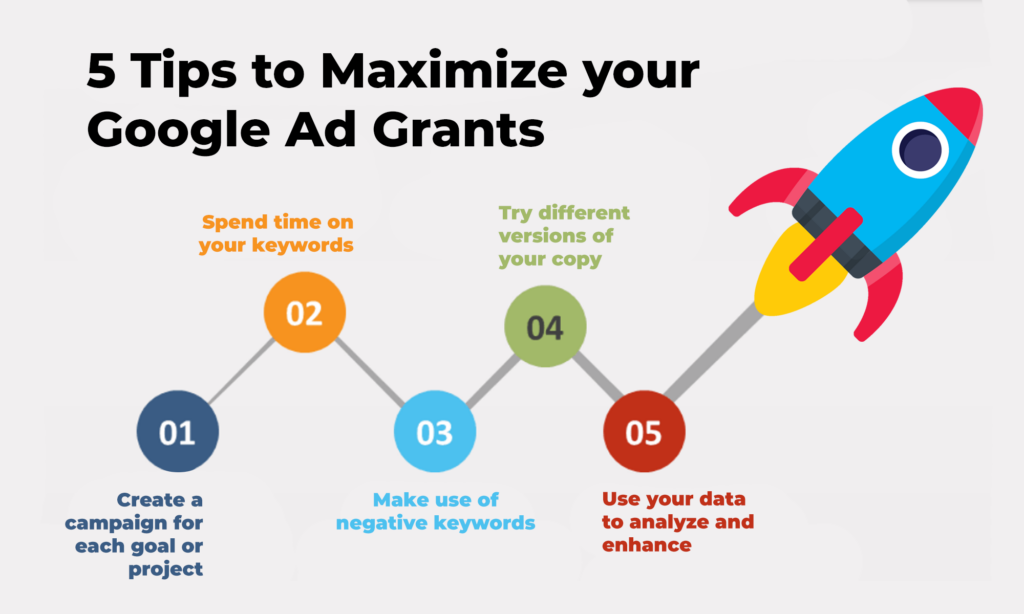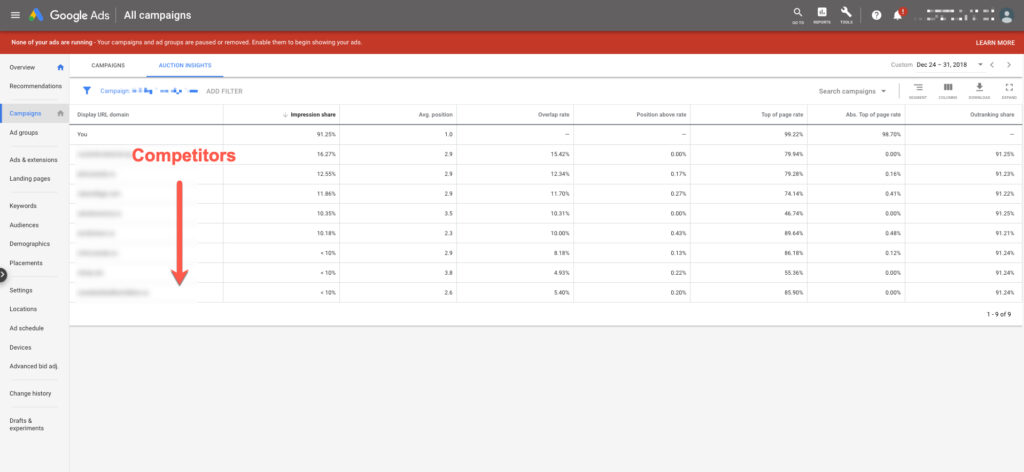Your Google Ads Grant account can be an excellent tool to drive visitors to your organization’s website, where they can donate, volunteer or find out more about your mission.
The search engine marketing space is crowded with both paying customers and charities using Google’s Ad Grants. For your organization to stand out and get the most traffic possible, you’ll need to make sure your campaigns are optimized.
Here are some tips to get you started:

1. Create a campaign for each goal or project:
You need to be very narrow with your focus on each ad campaign. Create one for donations, one for volunteerism and separate campaigns for each project or initiative. Remember, each landing page should be unique to that ad campaign and contain relevant information that is consistent with the keywords you select. Do not just send people to your homepage.
2. Spend time on your keywords:
It’s good to start with 20-30 keywords that align to a specific page on the website. The more focused the ad group, the better the ad targeting. It’s not about just driving as many people as possible to your website – you want the right traffic to keep your click-through rate (CTR) at the appropriate level. Make sure you consider short and long-string keywords. Consider what sentences people may be typing into the search engine when trying to find programs or services you offer.
- Use available keyword tools, Google’s Keyword Planner will help you find keyword ideas for your products and services based on your website content. You can also check on your competition and their suggested keywords by adding their website URL into the tool.
- There are also many advanced keyword research tools that may be worth checking out once you get comfortable with the platform. SEM Rush has an excellent tool, but there are hundreds of others out there.
- Make use of multiple keyword match styles defined by Google to attract a variety of users:
-
- Broad match: lets a keyword trigger your ad to show whenever someone searches for that phrase, similar phrases, singular or plural forms, misspellings, synonyms, stemmings (such as floor and flooring), related searches, and other relevant variations
- Phrase match: lets a keyword trigger your ad to show only when someone searches for your exact keyword phrase, or close variations of your exact keyword phrase, with potentially other words before or after that phrase. Close variations include misspellings, singular and plural forms, acronyms, stemmings, abbreviations, and accents
- Exact match: allows your ad to show only when someone searches for your keyword or close variants of your keyword. Close variants may include misspellings, singular or plural forms, stemmings abbreviations, accents
3. Make use of negative keyword features to block traffic that isn’t relevant to your organization.
For example, you may be bidding on the keyword ‘donations’ to try and drive financial donations. In that case, you don’t want your ads to show up when a search query includes ‘donations’ and ‘furniture’ or ‘cars’ ‚ so you’ll add those as negative keywords to filter out unwanted traffic.
4. Try different version of your ad copy
Your target audience will respond to different copy in different ways. Keep your headline and supporting text clear and relevant to the page you are sending visitors to.
It’s a good idea to try out multiple variations of each ad. Google will automatically test and serve up the one with the best response, so don’t be afraid to experiment.
5. Use your data to analyze and enhance.
The best way to make your ad campaign better is to continually analyze your results and make appropriate tweaks.
Analyze your ad performance and take a good look at problem areas where your ads/campaigns are under-performing.
The Auction Insights report is one of my favourite tools as it helps me to see who else is bidding on my keywords. It also contains impression shares, average position, overlap rate, position above rate, and top of page rate that each competitor has on a particular keyword. These are great tools to give you a sense of how well your campaign is performing and set a baseline.

Despite some limitations, Google Ad Grants is a great tool for any non-profit. Many organizations also have a paid Adwords account to supplement their search engine marketing efforts. If you’re interested in upping your organization’s search game get in touch – we’d love to talk to you about advancing your goals.